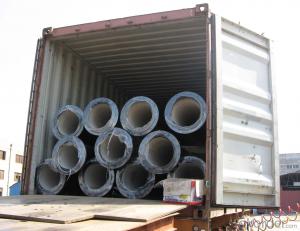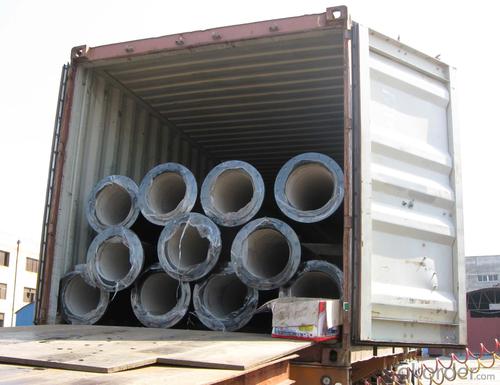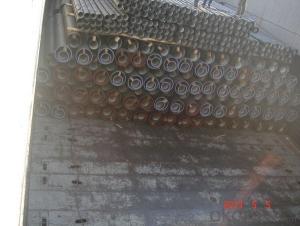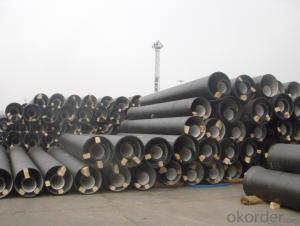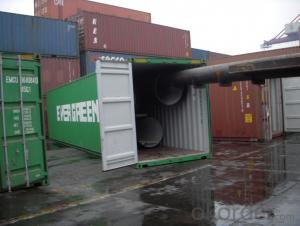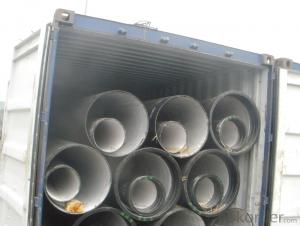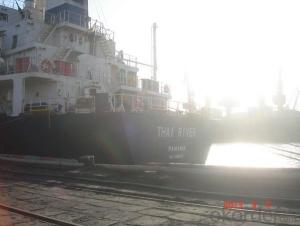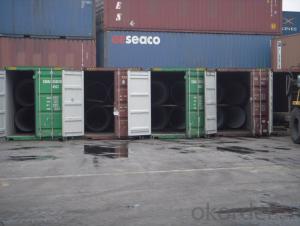DUCTILE IRON PIPES AND PIPE FITTINGS C CLASS DN1300
- Loading Port:
- Tianjin
- Payment Terms:
- TT OR LC
- Min Order Qty:
- 22 m.t
- Supply Capability:
- 30000 m.t/month
OKorder Service Pledge
OKorder Financial Service
You Might Also Like
Material : Ductile Cast Iron
Size Range : DN 80mm to DN 2000mm
Unit Effective Length : 6m or 5.7m
Manufacture Standard: ISO 2531:1998/ EN 545:2006/EN 598:2007
Annual capacity : 200,000 tons
Coating Exterior: Zinc 130g/m2 according to ISO 8179-1 and bitumen coating 70 microns.
Cement Interior: Portland Cement/ High Alumina Cement/ Sulphate Resisting Cement Lining according to ISO 4179
Special requirements on external coating and internal lining can be applied
We also provide accessories such as SBR/EPDM rubber gaskets, lubricant paste, pipe caps, PE sleeves, etc.
Additional Parts:
Each pipe is strictly inspected according to related standard to ensure permanently high performance.
Easy Installation at site and service free for life
Long Service Lifespan
Quotation will arrive you within 24hours once we get your inquiry.
We guarantee offering you a competitive price.
A copy of original inspection reports of pipes will be offered after shipment.
Photos of loading process will be sent to the customer after shipment effect.
We will follow-up the delivery progress after shipment effect and update to the customer on weekly basis.
- Q: How to choose a ductile cast iron pipe with guaranteed quality
- Cutting testing: iron filing resistance, filing issued a "Shua" sound, little sticky file, debris was gray with a small amount of white spot, look at the particles of different size, with small particles of fine powder, finger milling, it is easy to make fingers black. Ductile iron filing: when the resistance ratio of gray iron is slightly larger, there are obvious "Shua" sound ", little sticky file, debris was gray with fine bright particles ranging in size but with large particles, with finger milling chips, can be dyed black to gray fingers, but more black the degree of light
- Q: What are the differences between ductile cast iron pipes and centrifugal ductile iron pipes?
- Small, thin pipe fittings are usually rolled or continuously cast, and large, thick pipes are usually centrifugally cast. Compared to sand casting, the tissue is compact and homogeneous.
- Q: Can ductile iron pipes be used in areas with high soil acidity?
- Yes, ductile iron pipes can be used in areas with high soil acidity. Ductile iron is highly resistant to corrosion, including the effects of soil acidity, making it a suitable choice for such environments.
- Q: How can the internal and external walls of ductile iron pipes be protected from corrosion?
- Internal walls can be painted anti-corrosion paint, exterior anti-corrosion can choose to paint, but also useful anti-corrosion tape, or do 3PE anti-corrosion, look at your anti-corrosion requirements, cost budget and other construction objective conditions.
- Q: What is the expected deflection range for ductile iron pipes?
- The expected deflection range for ductile iron pipes typically falls within the range of 2-5% of the pipe's diameter.
- Q: What are the different methods for restraining ductile iron pipe?
- There are several different methods for restraining ductile iron pipe. These methods are used to prevent movement or displacement of the pipe due to internal pressure, external forces, or ground movement. The most common methods for restraining ductile iron pipe include: 1. Thrust blocks: Thrust blocks are concrete blocks or structures that are placed against the pipe at bends, tees, or other changes in direction. These blocks are designed to resist the forces exerted by the flowing water or other fluids within the pipe, effectively anchoring the pipe in place. 2. Mechanical restraints: Mechanical restraints, such as harnesses or clamps, are devices that are installed around the pipe and attached to a fixed structure, such as a wall or a concrete anchor. These restraints provide a physical barrier that prevents the pipe from moving or shifting. 3. Pipe restraints: Pipe restraints are devices that are directly attached to the pipe and anchored to a fixed structure. These restraints can include pipe clamps, pipe restraints, or pipe saddles. They are designed to securely hold the pipe in place and resist any movement or displacement. 4. Pipe bedding and backfill: Proper pipe bedding and backfilling is important for restraining ductile iron pipe. The pipe must be properly supported and surrounded by compacted material to prevent movement or shifting. This method involves carefully placing and compacting soil or other suitable materials around the pipe to provide stability and prevent displacement. 5. Trench walls: The walls of the trench in which the ductile iron pipe is installed can also provide some level of restraint. By properly compacting the soil against the pipe and ensuring proper compaction and stability of the trench walls, the pipe can be effectively restrained and prevented from movement. Overall, the different methods for restraining ductile iron pipe aim to ensure the pipe remains securely in place and does not experience any displacement or movement. The choice of method depends on factors such as the location, application, and the forces acting on the pipe. It is important to consult with engineers and follow industry guidelines and standards to determine the most appropriate method for restraining ductile iron pipe in specific situations.
- Q: Ductile iron pipe is how many years warranty
- In the ferrite and pearlite matrix on the distribution of a certain number of spheroidal graphite, according to the nominal diameter and the elongation of different microstructure of ferrite and pearlite in different proportions of small caliber pearlite percentage is generally not more than 20%, large diameter of the general control in about 25%.
- Q: What are the typical joint sealing requirements for ductile iron pipes under pressure?
- The typical joint sealing requirements for ductile iron pipes under pressure involve the use of gaskets and mechanical joints to ensure a leak-free connection. Gaskets are typically made of rubber or synthetic materials and are placed between the pipe ends to create a tight seal. These gaskets are designed to withstand the pressure of the flowing fluid and prevent any leakage. They also provide flexibility to accommodate for any slight misalignment or movement of the pipes. Mechanical joints, such as push-on joints or restrained joints, are another common method of sealing ductile iron pipes. These joints consist of a mechanical connection that securely holds the pipe ends together. They can provide a reliable seal without the need for additional gaskets. In addition to gaskets and mechanical joints, proper installation techniques are crucial for ensuring effective joint sealing. This includes proper alignment of the pipes, correct tightening of bolts or screws, and the use of appropriate lubricants or sealants. It is important to note that the specific joint sealing requirements for ductile iron pipes under pressure may vary depending on the application, the type of fluid being transported, and the applicable industry standards or regulations. Therefore, it is essential to consult the manufacturer's guidelines and relevant codes to determine the appropriate joint sealing requirements for a specific project.
- Q: What are the different sizes available for ductile iron pipes?
- Ductile iron pipes are available in various sizes, typically ranging from 3 inches to 64 inches in diameter.
- Q: Can ductile iron pipe be used for hydroelectric power generation?
- Yes, ductile iron pipe can be used for hydroelectric power generation. Ductile iron pipes are known for their strength, durability, and resistance to corrosion, making them suitable for various applications including the transportation of water in hydroelectric power plants.
Send your message to us
DUCTILE IRON PIPES AND PIPE FITTINGS C CLASS DN1300
- Loading Port:
- Tianjin
- Payment Terms:
- TT OR LC
- Min Order Qty:
- 22 m.t
- Supply Capability:
- 30000 m.t/month
OKorder Service Pledge
OKorder Financial Service
Similar products
Hot products
Hot Searches
Related keywords
